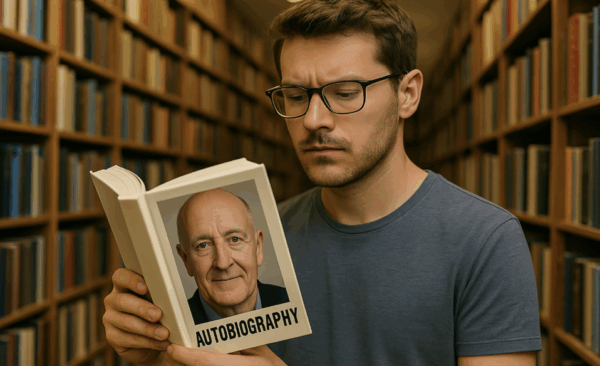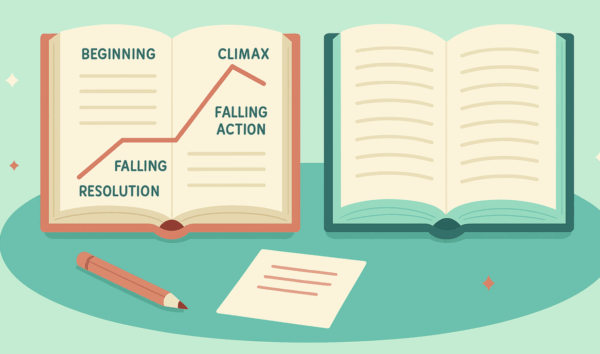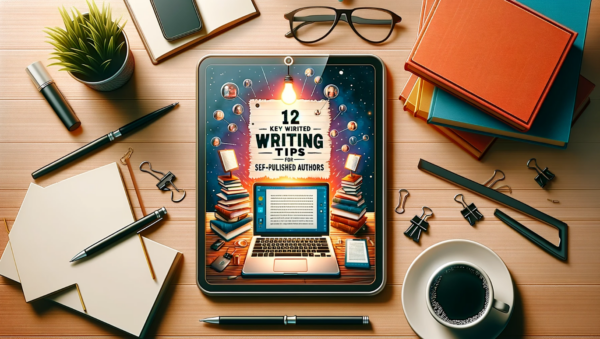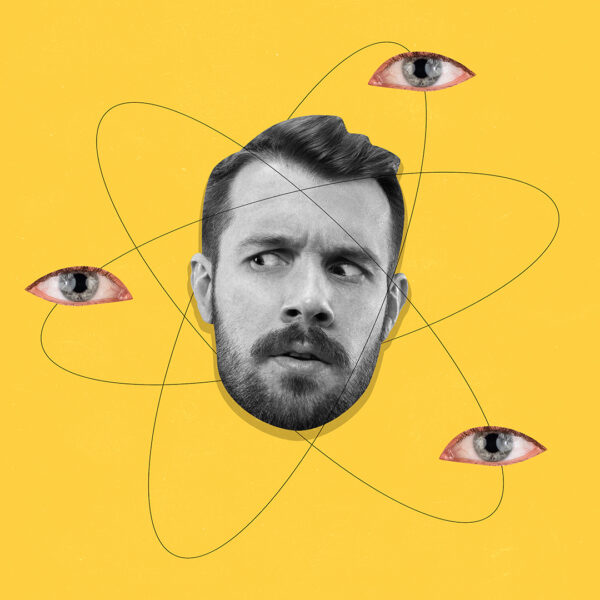If literature were a dinner party, paradox would be the charming guest who says something utterly confusing—and somehow, it makes perfect sense. A paradox is a statement that seems self-contradictory on the surface, but once you sit with it (preferably with a strong coffee), it reveals a deeper truth.
From Shakespeare’s “I must be cruel to be kind” to Orwell’s “War is peace”, paradoxes have long been used to challenge our logic and stir our imaginations. Paradoxes add depth to major literary themes by highlighting contradictions that reflect the complexity of real life. But what is the definition of paradox in literature, exactly? And how can such contradictions be so… insightful?
In this article, we’ll unpack the paradox definition in literature, explore famous examples, and show you why writers love to bend reality just enough to make you think twice.
What Is a Paradox?
Let’s start with the basics: a paradox is a statement that contradicts itself — yet somehow rings true. It’s the literary equivalent of saying, “Less is more” and actually meaning it.
In general, paradoxes expose a truth by turning logic on its head. In literature, they’re used to create depth, tension, irony, or even a bit of intellectual mischief. Think of a paradox as a brain teaser wrapped in poetic flair — it makes you pause and say, “Wait… what?”, followed quickly by, “Oh… I get it.”
Paradox Definition in Literature:
A paradox in literature is a seemingly contradictory statement or situation that reveals a deeper truth or insight when examined closely.
Paradoxes often contribute to plot twists or deeper thematic arcs and writers use paradoxes to explore complex ideas, challenge assumptions, or add a layer of sophistication to their work. It’s not about confusing the reader — it’s about inviting them to think deeper.
Paradox vs. Oxymoron: What’s the Difference?
At first glance, a paradox and an oxymoron might seem like literary twins — both involve contradiction, both sound a little puzzling — but they’re actually quite different in how they operate.
An oxymoron is a short phrase, usually two or three words, that combines opposing ideas. Think of expressions like “deafening silence,” “bittersweet,” or “seriously funny.” These mini-contradictions are often used for dramatic or poetic effect — they catch your attention, make you pause, and sometimes even make you smile.
A paradox, on the other hand, is more like a full thought experiment. It can be a sentence, a situation, or even an entire theme that appears illogical at first but reveals a deeper truth when you take a moment to reflect. For example, “The only constant is change” seems contradictory — how can change be constant? But once you sit with it, it makes perfect sense.
So while oxymorons play with words, paradoxes play with ideas. While they’re not the same as irony, paradoxes can have a similar effect, often making readers question what’s real, what’s expected, and what lies beneath the surface.
Why Writers Use Paradoxes in Literature
Writers don’t just toss paradoxes into their work to sound clever (well, not only for that reason). Paradoxes serve a powerful purpose in literature: they make readers think, question, and dig deeper. They’re the literary equivalent of planting a seed that blossoms the more you reflect.
So why are paradoxes so popular among authors, poets, and playwrights? Here are a few reasons:
1. To Challenge the Reader’s Perspective
A good paradox forces us to pause and rethink what we believe to be true. It introduces complexity where things seem simple, and simplicity where things seem complex. It encourages critical thinking — something literature does best when it’s not spoon-feeding the reader.
2. To Add Depth and Layers to a Theme
Themes like love, time, identity, or truth often resist black-and-white thinking. Paradoxes help writers explore these gray areas with more nuance. For example, in 1984, the slogan “Freedom is slavery” might sound absurd at first — but in context, it reveals the twisted logic of a totalitarian regime.
3. To Reflect Inner Conflict
Characters are rarely one-dimensional. They have contradictions, doubts, and clashing desires — just like us. Paradoxes work especially well in introspective first-person narratives, where a character’s inner turmoil is front and center. They often appear in dialogue making it more realistic, adding realism and internal conflict, helping readers connect with a character’s emotional or philosophical struggle. A character who says, “I feel most alone in a crowd,” reveals something deep and relatable in just one sentence.
4. To Spark Emotional or Philosophical Engagement
Paradoxes are memorable. They echo in your mind long after you’ve turned the page. They create that “Wait… huh?” moment — followed by a “Whoa.” That emotional or intellectual pause is exactly what great literature aims for.
In short, paradoxes are not just pretty word puzzles — they’re storytelling tools that push boundaries and reveal truth in unexpected ways.
Famous Examples of Paradox in Literature
Now that we’ve defined what a paradox is (and made peace with the fact that it does make sense eventually), let’s look at how some of the world’s most celebrated authors have used paradoxes to elevate their writing.
These literary paradoxes aren’t just clever lines — they’re powerful tools that reveal character depth, expose societal contradictions, or leave readers wonderfully unsettled.
“I must be cruel to be kind.” — William Shakespeare, Hamlet
On the surface, this statement sounds like emotional whiplash. How can cruelty be kind? But within the context of Hamlet, it reflects the painful truth that sometimes difficult actions are necessary for the greater good. Welcome to moral complexity, courtesy of Shakespeare.
“War is peace. Freedom is slavery. Ignorance is strength.” — George Orwell, 1984
Orwell didn’t just write paradoxes — he weaponized them. These slogans of the oppressive regime in 1984 reveal how language can be twisted to control thought. Each statement contradicts itself, yet in the warped reality of the novel, they serve a chilling logic.
“I can resist everything except temptation.” — Oscar Wilde, Lady Windermere’s Fan
Wilde was a master of paradox wrapped in wit. This line is humorous, yes — but also deeply human. It captures the essence of internal conflict: knowing better, yet doing otherwise. (We’ve all been there. Probably with snacks.)
“Much madness is divinest sense.” — Emily Dickinson
Dickinson flips the definition of sanity on its head. What society deems “madness” may actually be the truest form of insight — a paradox that celebrates individuality and questions conformity.
“It was the best of times, it was the worst of times…” — Charles Dickens, A Tale of Two Cities
This iconic opening line throws you straight into contradiction. How can both extremes exist at once? But Dickens isn’t confused — he’s capturing the turbulent, conflicting reality of a revolutionary era.
Paradoxes like these prove that literature doesn’t shy away from contradictions — it embraces them. Through these elegant contradictions, authors explore truths too complex for straight answers.
How to Identify a Paradox in a Text
So, you’re reading a novel, a poem, or maybe even a Shakespeare monologue, and suddenly a line makes your brain short-circuit. That might just be a paradox waving at you. But how can you tell the difference between a deep literary paradox and a sentence that just doesn’t make sense?
Here’s how to spot one in the wild:
Look for a Self-Contradictory Statement
Paradoxes often sound like they’re arguing with themselves. Phrases like “less is more” or “the beginning of the end” make you pause because they seem logically impossible. But if the contradiction feels intentional, and it nudges you to think deeper — you’ve got a paradox on your hands.
Ask: “Does This Reveal a Hidden Truth?”
A true literary paradox isn’t just a contradiction for contradiction’s sake. It should lead somewhere — to a philosophical insight, a character’s internal conflict, or a theme that challenges simple logic. If the line makes more sense the more you think about it, it’s likely a paradox.
Consider the Context
Paradoxes don’t exist in a vacuum — the surrounding story, tone, and theme matter. In a dystopian novel, paradoxes might reveal societal hypocrisy. In a love poem, they might express emotional tension. Always ask: what’s the author trying to show by turning logic on its head?
Watch for Tone: Is It Ironic or Philosophical?
Paradoxes often carry a serious or reflective tone, sometimes with a hint of irony or dry humor. If a statement makes you laugh uncomfortably and rethink your worldview, you’re probably dealing with a paradox — not a typo.
Quick Practice Example:
“The more you learn, the less you know.”
At first glance, it sounds wrong. But dig deeper and it’s a statement about humility — the more you study, the more you realize how vast your ignorance really is. Classic paradox.
With a bit of practice, identifying paradoxes becomes second nature — like spotting plot twists or overused metaphors. And once you start noticing them, you’ll find they’re everywhere, quietly adding layers of meaning beneath the surface.
Using Paradox in Your Own Writing
Now that you’re well-versed in spotting paradoxes, why not try writing your own? Whether you’re working on your first book, a poem, or a late-night journal entry that feels way too deep, paradoxes can be powerful tools for adding depth, tension, and sophistication.
But like any literary device, paradox is best used with intention — not just because it sounds fancy (although let’s be honest, it usually does).
1. Start with a Contradiction
Begin by identifying two opposing ideas. Think about emotional opposites (love and hate), logical contradictions (freedom and control), or character traits (strength and vulnerability). Your goal is to find a pair that, while conflicting, can reveal something true when combined.
Example:
“The closer I get to you, the further I feel from myself.”
It’s contradictory, yes. But it also says something real about identity and relationships.
2. Make It Meaningful, Not Just Clever
A good paradox shouldn’t be a party trick — it should serve your story. Does it reflect your character’s inner struggle? Does it capture a theme you’re exploring? The best paradoxes make the reader stop and say, “Oh wow… that’s true.”
Bad paradoxes just make them say, “…Huh?” (and not in a good way).
3. Keep It Clear — Even When It’s Complex
Paradox isn’t an excuse for confusing writing. In fact, the magic lies in taking something complicated and expressing it in a surprisingly simple way. Aim for clarity within the contradiction — that’s what makes it hit hard.
4. Practice with Prompts
Try finishing these sentences with your own paradoxical twist:
- She found freedom in…
- To stay safe, he had to…
- The truth felt like…
Let your brain have a little fun bending the rules — that’s where great paradoxes are born.
Paradoxes invite your readers to wrestle with ideas, not just read them. So whether you’re writing the next great literary masterpiece or just want your Instagram captions to sound profound, a well-placed paradox might be your secret weapon.
Final Thoughts
Paradoxes are proof that literature doesn’t need to make immediate sense to be meaningful — in fact, sometimes the most powerful truths are hidden inside contradictions. From Shakespeare’s conflicted characters to Orwell’s chilling slogans, paradoxes force us to pause, think, and see the world from a different angle.
Let’s recap what we’ve covered:
- A paradox is a seemingly self-contradictory statement that reveals a deeper truth.
- It differs from an oxymoron, which is a short phrase combining opposites (like jumbo shrimp — yes, we’re still confused too).
- Authors use paradoxes to explore complex ideas, express emotional conflict, and add depth to their themes.
- You can spot them by looking for contradictions that somehow make sense — and with a little practice, you can write your own.
In literature, as in life, things aren’t always black and white. Paradoxes help us live in the gray areas — where the most interesting stories usually happen.
Your Publishing Journey Awaits – Start NowFAQs – Paradox Definition Literature
Q1: What is a paradox in literature?
A paradox in literature is a statement or situation that appears to contradict itself but reveals a deeper truth upon reflection. Writers use paradoxes to highlight complexity, irony, or hidden meaning within characters, themes, or dialogue. These contradictions often make the reader pause and reconsider the ideas being presented. Paradoxes can add depth and provoke thought, making them a powerful literary device.
Q2: What is the best example of a paradox?
One of the most famous examples is Shakespeare’s line from Hamlet: “I must be cruel to be kind.” At first glance, it seems contradictory—how can cruelty be kindness? But within the story, it makes sense: Hamlet believes that by taking harsh action, he will ultimately do good. It’s a classic example of a literary paradox revealing emotional and moral conflict.
Q3: What is the difference between a paradox and an oxymoron?
An oxymoron is a short phrase (usually two words) that combines contradictory terms, like “bittersweet” or “deafening silence.” A paradox is broader—it’s often a full statement or concept that appears contradictory but holds a deeper meaning. While oxymorons are more stylistic, paradoxes are usually conceptual and philosophical. In short: oxymorons play with words, paradoxes play with ideas.
Q4: How do you explain a paradox to a child?
You can explain a paradox to a child by using a simple example like, “The more you learn, the less you know.” Tell them it’s something that sounds confusing at first but actually teaches you something interesting. You might say, “It’s like when something feels wrong but turns out to be right.” Use everyday situations to help them grasp the idea that some truths are hidden inside contradictions.
Q5: Why do authors use paradoxes in writing?
Authors use paradoxes to challenge readers, express inner conflict, or explore complex ideas that aren’t black and white. Paradoxes make writing more thought-provoking and emotionally layered. They can reflect how real-life situations are full of contradictions, making stories feel more human and relatable. In essence, paradoxes add richness and nuance to literary work.
Q6: What is the closest meaning of paradox?
The closest meaning of “paradox” is a contradiction that reveals a hidden truth. It’s something that seems to go against logic, but when you think about it, it actually makes sense. In literature, paradoxes help express truths that aren’t easy to say in straightforward terms. They invite readers to look beyond the obvious.
Q7: How can you identify a paradox in a text?
To identify a paradox, look for statements that seem self-contradictory or confusing at first glance. Ask yourself if the contradiction serves a purpose—does it reveal something deeper about the character, theme, or situation? If a line makes more sense the longer you think about it, it’s likely a paradox. Context and tone are key clues to spotting them.







